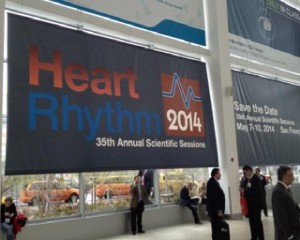May 13th, 2013
Things I found at HRS 2013: Education, Science, Friends, and Mentors
Sandeep K Goyal, MD
Several Cardiology Fellows who are attending the Heart Rhythm Society meeting in Denver this week are blogging for CardioExchange. The Fellows include Luis Garcia, Sandeep Goyal, and Amit Mehrotra. You can view the previous post here.
I was strolling near the Convention Center around 1 pm Sunday, and the area was empty. Until a few hours back, this same place was full of people in suits and ties, their HRS badges hanging across their chests. The Hyatt lobby bar, where getting a seat was hard for last few days, was empty. It was a sign — HRS has ended, and it’s time to go home!
The City of Denver served as an excellent host to this conference. On a personal level, I learned a lot, made quite a few new friends (or connections as we call them these days!), and saw lots of old friends.
During my cardiology fellowship interviews, I met a lot of people who provided useful insights in their home programs and eventually played a big role in my decision to rank the programs the way I did. I never had a chance to see most of these people again, never had a chance to thank them in person. This HRS meeting connected me to lot of them, and I could finally express my gratitude for their help and advice 4 years ago.
Dr. Brian Olshansky struck me as a serious academic, when I met him for an interview at University of Iowa. I got to see his witty and sarcastic side during his Hyde Park Session, “Obamacare: Our Salvation?” He poked fun at rising healthcare costs, loss of physician autonomy, and physician-patient relationships. He was anguished that all the effort was directed at the health of the healthcare system and not the health of the patient.
Dr. Anne Curtis took the grand concourse for another Hyde Park Session, “Is There a Future for Academic EPs?” This was a much more serious, but optimistic, outlook on the future of academic EP. She stressed that keeping academic EP alive is not only useful but also indispensable. Yes, public funding is decreasing, but on the other hand there is more philanthropy. She suggested that cardiology/EP chairs at academic institutions engage with community philanthropists and help fund endowed chairs. Her advice for young trainees like me: If you have curiosity and drive to innovate and to seek answers to problems that perplex others, you have a very bright future in academic medicine.
I am leaving Denver with more knowledge, more friends, and more optimism than when I arrived here. I am already looking forward to San Francisco for HRS 2014.

